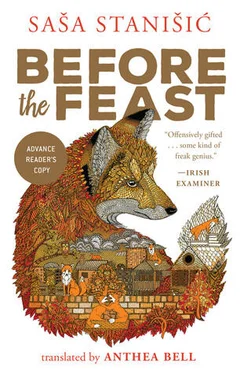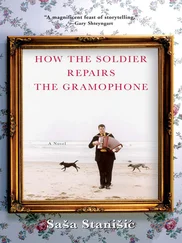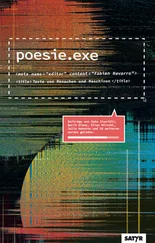Delays in the course of events, she said. She had been beating about the bush. And beating about the bush — maybe that is the only matter in which Herr Schramm is still a soldier. Either you have an order to obey or you don’t. Herr Schramm is a critical man when it comes to standing to attention and not standing to attention. Not standing to attention isn’t the result of beating about the bush. Wilfried Schramm has never beaten about the bush. Just as he has never bowed to anyone or praised himself, or told lies to hurt someone else. Do right and fear no one. Not standing to attention comes from the fact that he went on his knees to his own mistakes for a long time. Comes from the fact that he told the truth to the disadvantage of others, and the truth weighed heavily. In concrete terms, it comes from the fact that now, in his old age, Herr Schramm stands bending over the engines of agricultural machines all day, if he isn’t crawling under them.
Maybe because it is so long before Schramm says anything, Anna remarks, “It smells funny in here.”
“That’s the little tree.” Herr Schramm points to the dangling tree-shaped air freshener. And, “Family doesn’t mean anything. That wouldn’t do for me or for them now. I just need—” Herr Schramm turns to her again, bags under his eyes, broken veins, he scratches under his collar and leaves his sentence unfinished.
“Okay.” Anna is breathing freely again. “We’ll do it the way I say. Give me the pistol and come with me. We’ll fetch my ID and buy some cigarettes, and then we’ll see.”
Herr Schramm taps the steering wheel. On average men in Western Europe find themselves in mortal danger once every 13.4 years, women once every 15.1 years. Anna must be about eighteen. He gives her the pistol. The old man and the young woman climb out of the car. “Just a moment,” says the old man, and he gets an umbrella out of the boot. The old man and the young woman go over the fields and meadows, down the roads and on into the night.
THE VILLAGE HAS NO WORK TO DO ON THE ROADS by night. The night offers no jobs for anyone. There’s no late shift, no hotel, no nightwatchman, no radio DJ, no nocturnal work on a building site. In the village, so the village thinks, no one works for erotic hotlines.
On the roads, the heavenly tree of the stars is hung with moist fruit as blue as night.
By night, only Ulli sometimes earns something at the garage. If there’s been a late football match to talk about, or the building of a bungalow beside the lake, or an asylum-seekers’ hostel anywhere, then that’s discussed after midnight too. Closing time is one at the latest. After one, the owner of the cigarette machine still earns a few euros, but that doesn’t count, he’s never been to Fürstenfelde, he lives in Ingolstadt or on Ibiza, he’d be surprised on such a night as this. After that the bakery begins earning, but then the time’s not night any more, then it’s traditionally called the first light of dawn, except at the first light of dawn on Monday, when the bakery is closed.
Night, clouds, violet, the color of the leggings Anna wears to go running along the roads.
On the roads of dear, dirty Fürstenfelde are two elderly, devout Fürstenfelde women, day laborers, they’ve lived for umpteen years in a hut close to the wall, wet night, hunger and stale air, tallow, racing hearts, lost their men to wars. Thin soup and bread, it’s thin soup and bread or go begging over the border in Mecklenburg, fight gypsies, spend the winter in refuges for the poor as if to shame the Prussian rulers, it’s in Mecklenburg, of all places, that they find help in their need. They save for years to go on a journey with no clear aim. They know the legend of the giant who made two lakes out of one here, and they set off south to the giant’s mountainous home. They take with them all they possess, which isn’t much; their names are Isolde Kerner and Flora Kohl, they are on the road, they have no fear but they are also very much afraid, they share bread and water, going hand in hand, asking their way to the south, where is it, that south, praying, they don’t have to say much else. Isolde has lumbago, Flora rubs herbal ointments into her.
The seventeenth century with its wars is over, they travel over scorched earth, they see suffering greater than their own, the bells ring, witches are burnt, idolatry doesn’t find itself up in court so often. They talk to those who will talk, they are wary of those who fling insults at them. And many insults are flung; times are not easy. When Flora wanted to claim a day’s wage long owed to her by the Kladden woman, the woman refused on account of a broken jug, adding, you’ll get nothing from me, you clumsy whore . Flora had expected the refusal but not the insult. Then Isolde stepped in front of her friend and invited the Kladden woman to shave her arsehole .
So what else? To a man we might say you sluggard, you whoreson knave . Or call him a great oaf , a booby , an ox . A Captain Sharp . And there were variations: you murdering rogue, you clodpole . Women: sacramental whore for the pastor’s wife, Polack whore (not necessarily Polish), foreign whore (must be foreign). Mort, doxy . On the streets by night you might hear: Where’s that tailor, that furriner, Devil break his neck? Or: I’ll ask the Devil to take the parson, I’ll have none of them . To wish the French pox on someone, male or female, was unkind. Worst of all was to call a man a rogue of a French whorecatcher .
On the roads of Fürstenfelde at night there are no beggar women now. Isolde and Flora defied insults and the weather, witches and lumbago, they defied the improbability of their ever having set out on their journey. Two elderly women holding hands when the fear was too much for them. Sharing their soup and bread. Some say all they found on the journey was death. We say you’re dead only if you’re found dead.
On the roads there’s the night that makes us visible, the streetlamps shine. At the parish council meeting Frau Reiff recently suggested installing movement sensors so that only someone who needs light would be lit up. That would save electricity and money. But you know how it goes. Others who came to Fürstenfelde recently thought it was a good idea, the old inhabitants couldn’t come to any clear conclusion. After the meeting everyone praised Frau Reiff for her good idea. We’ll admit that expressing our opinion to the authorities isn’t our strongest point. Then Frau Reiff, perhaps joking but probably also in earnest, suggested getting everyone born before 1980 to have group therapy to teach them to be braver. But she hadn’t stopped to think that here we’re even more afraid of psychologists than of courage.
The wet roads shine by night as if covered with cling film.
After harvest, after threshing, after winter sowing we drive tractors and trucks about the roads by night much faster than the speed limit allows, but that’s how it is when you’re driving something powerful, loud and shiny and you’re sitting high up on it. It’s as if when you want to go home after riding high above the fields all day, breathing dust, then on the roads by night you want to show that you’re the man, you represent agriculture, you’re the one who feeds us, we all have our feet under your table. Then you switch off the engine, you cycle home sniffing through your nostrils all clogged with dust. How good a shower will be.
By night in her gumboots, not satisfied with the progress on her painting: Frau Kranz.
Stung by a midge in the rain: Herr Schramm. “I ask you!” says Herr Schramm. On average midges sting more people with a high concentration of bacteria on their feet than people with fewer bacteria on their feet. Since knowing that, Herr Schramm uses anti-bacterial soap, but all the same he gets stung, only not stung so often on his feet.
Читать дальше












